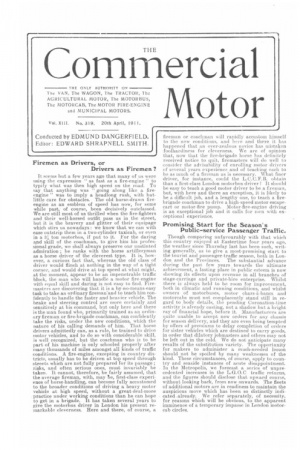Firemen as Drivers, or Drivers as Firemen ?
Page 1

If you've noticed an error in this article please click here to report it so we can fix it.
It seems but a few years ago that many of us were using the expression " as fast as a fire-engine " to typify what was then high speed on the road. To say that anything was "going along like a fireengine" was to imply a headlong rush, with butlittle care for obstacles. The old horse-drawn fireengine as an emblem of speed has now, for some while past, of course, been decisively outclassed. We are still most of us thrilled when the fire-fighters and their well-horsed outfit pass us in the street, but it is the bravery and glitter of their equipage which stirs us nowadays : we know that we can with ease outstrip them in a two-cylinder taxicab, or even in a 31 ton motorbus, if put to it. For the daring and skill of the coachman, to give him his professional grade, we shall always preserve our unstinted admiration ; he ranks with the horse artilleryman as a horse driver of the cleverest type. It is, however, a curious fact that, whereas the old class of driver would flinch at nothing in the way of a tight corner, and would drive at top speed at what might, at the moment, appear to be an impenetrable traffic block, the man who will handle a motor fire-engine with equal skill and daring is not easy to find. Firemasters are discovering that it is a by-no-means-easy task to take an ordinary fireman"and to teach him confidently to handle the faster and heavier vehicle. The brake and steering control are more certainly and sensitively at his command, but only here and there is the man found who, primarily trained as an ordinary fireman or fire-brigade coachman, can confidently take the risks, under the new conditions, which the nature of his calling demands of him. That horse drivers admittedly can, as a rule, be trained to drive motor vehicles, and to do so with considerable skill, is well recognized, but the coachman who is to be part of his machine is only schooled properly after many thousands of miles amongst all kinds of traffic conditions. A fire-engine, .excepting in country districts, usually has to be driven at top speed through streets which are not fully prepared for its passage ; risks, and often serious ones, must invariably he taken. It cannot, therefore, be fairly assumed, that the average fireman, with, may t e, first-class experience of horse-handling, can become fully accustomed to the broader conditions of driving a heavy motor vehicle at high speed, without a great-deal-more practice under working conditions than he can hope to get in a brigade. It has taken several years to give the motorbus driver in London his present remarkable cleverness. Here and there, of course, a fireman or coachman will rapidly accustom himself to the new conditions, and here and there. it has happened that an over-zealous novice has mistaken foolhardiness for cleverness. We are of opinion that now that the lire-brigade horse has definitely received notice to quit, firemasters will do well to consider the advisability of enrolling motor drivers of several years experdeneo and of teaching each to be as much of a fireman as is necessary. What finer driver, for instance, could the L.C.C.F.B. obtain than a first-class London motorbus driver ? It should be easy to teach a good motor driver to be a fireman, but, with here and there an exception, it is likely to be a difficult job, and a lengthy one, to teach a firebrigade coachman to drive a high-speed motor escapecart or motor-fire pump. Motor-fire-engine driving is an exceptional job and itcalls for men with exceptional experience.
Promising Start for the Season's Public-service Passenger Traffic.
Though comparing unfavourably with that which this country enjoyed at Eastertime four years ago, the weather since Thursday last has been such, writing generally, as to give a most-promising start to the tourist and passenger-traffic season, both in London. and the Provinces. The substantial advance during the past few years towards the ultimate achievement, a lasting place in public esteem is now showing its effects upon revenue in all branches of stage-carriage and private-hire enterprise. Whilst there is always held to be room for improvement,
i both n climatic and running conditions, and whilst owners of motorbuses, motor chars-a-bancs and motorcabs must not complacently stand still in re gard i
to body details, the pending Coronation-time activity s already casting, not a shadow but a bright ray of financial hope, before it. Manufacturers are quite unable to accept new orders for any chassis for season delivery, and they are even being tempted by offers of premiums to delay completion of orders for sister vehicles which are destined to carry goods, in order that dilatory johmasters and others may not be left out in the cold. We do not anticipate many results of the substitution variety. The opportunity for makers to administer a much-needed lesson should not be spoiled by many weaknesses of the kind. These circumstances, of course, apply to country and seaside instances of acute disappointment. In the Metropolis, we forecast a series of unprecedented increases in the L.G.O.0 traffic returns, and the figures should disclose that upward course, without looking back, from now onwards. The fleets of additional motors are in readiness to maintain the auspicious move which has been so distinctly indicated.already. We refer separately, of necessity, for reasons which will be obvious, to the apparent imminence of a temporary impasse in London motorcab circles.


















